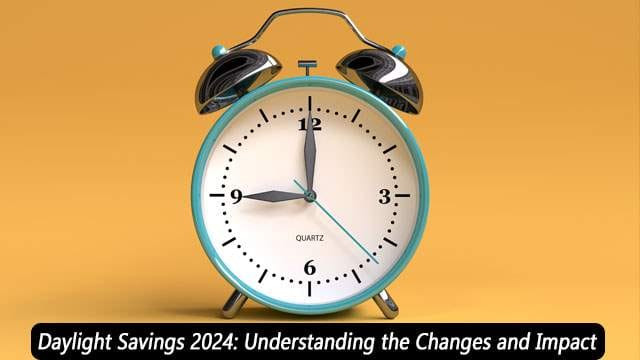Daylight Savings 2024: Know The Changes And Impact

Introduction
Confused about daylight savings and how it affects your daily life? You’re not alone. Many people find the twice a year clock change frustrating and puzzling. This article will demystify daylight savings, explain what it’s for and give you all the info you need for 2024.
Problem: The Confusion Around Daylight Savings
Millions of people ask every year, “When is daylight savings?” The process of moving the clocks forward in the spring and back in the fall has been around for over a century and yet it still confuses and inconveniences us. From missed appointments to disrupted sleep patterns, the impact of daylight savings time is big. Despite all this, it continues and we need to understand it to manage its effects on our lives.
Frustration: The Disruption to Our Daily Lives
Daylight savings time (DST) disrupts our lives twice a year. In spring we lose an hour, in fall we gain an hour. This simple change can have big consequences. Studies show the spring forward is linked to an increase in heart attacks, workplace injuries and even car accidents. Losing sleep affects our mood, productivity and overall health. The fall back can disrupt our internal clocks and cause the same health issues. So why do we still do this?
Solution: Get Ready for Daylight Savings 2024
The key to daylight savings is preparation and knowledge. By knowing when daylight savings 2024 is and why it’s here you can minimize its effects and even benefit from it.
What is Daylight Savings?
Daylight savings is the practice of moving the clock forward by one hour during the warmer months to get more evening daylight. This means more daylight in the evening and less in the morning. The idea is to make better use of daylight during the longer summer days so we can have more daylight in the evening.
History of Daylight Savings
The idea of daylight savings was first proposed by Benjamin Franklin in 1784 to save candles. But it wasn’t until World War I that DST was implemented to conserve fuel. Germany was the first country to adopt daylight savings on April 30, 1916. The US followed in 1918.
Why Do We Have Daylight Savings?
The main reason for daylight savings is to make better use of daylight during the longer days of spring, summer and early autumn. By moving an hour of daylight from morning to evening DST aims to reduce energy consumption and get us to spend more time outside in the evening.
Daylight Savings 2024?
Save the date: daylight savings 2024 starts on Sunday, March 10th when we spring forward at 2:00 AM and ends on Sunday, November 3rd when we fall back at 2:00 AM.
Read More: Taylor Swift: Net Worth, Age, Boyfriend, and Her New Album 2024
Daylight Savings 2024
To make the time change less painful:
- Gradually Adjust Your Sleep: In the days leading up to the time change, go to bed 15 minutes earlier each night and wake up 15 minutes earlier each morning.
- Good Sleep Hygiene: Create a bedtime routine, limit screen time before bed and make sure your sleep environment is comfy.
- Stay Active: Exercise can help regulate your sleep and reduce the time change impact.
- Get Outside: Natural light during the day will help your body adjust.
Daylight Savings Time Impact
The impact of daylight savings time varies by your lifestyle and location. Here are the areas affected:
- Health: The time change can mess with your sleep, leading to sleep deprivation, mood swings and increased stress. Studies show the spring forward is linked to an increase in heart attacks and strokes.
- Productivity: Losing an hour in spring means decreased productivity and focus at work and school.
- Safety: More daylight in the evening means less traffic accidents and crime. But the initial adjustment period sees a spike in accidents from drowsy driving.
- Energy Consumption: DST is supposed to reduce energy usage by making better use of natural light. But studies show mixed results on its effectiveness in saving energy.
Global Daylight Savings
Not all countries observe daylight savings time. It’s mainly practiced in North America, Europe and parts of the Middle East. Countries near the equator don’t observe DST as the daylight variation throughout the year is minimal. Some countries have opted out of DST in recent years citing the disruption and minimal energy savings as reasons.
Controversies and Future of Daylight Savings
Daylight savings is a hot topic of debate. Critics say the disruption to our daily lives and minimal energy savings don’t justify it. Some states in the U.S. have proposed legislation to get rid of DST, while others want to make it permanent. The European Union has also considered ending the biannual clock changes and leaving it up to individual member states to decide their standard time.
Daylight Savings Benefits
Despite the controversies, daylight savings has some perks:
- Longer Evenings: More daylight means more time for outdoor activities which is good for mental and physical health.
- Economic Boost: Retailers and the leisure industry benefit from longer daylight hours as people are more likely to shop and play.
- Energy Savings: While the energy savings are minimal, DST reduces the need for artificial light and heat in the evening.
How to Get the Most out of Daylight Savings 2024
To get the most out of daylight savings 2024:
- Go Outside: Use the extra daylight to get outside and go hiking, cycling or just take a walk in the park.
- Schedule Evening Socials: Longer evenings are perfect for socialising with friends and family. Have barbecues, picnics or evening get togethers to make the most of the extra daylight.
- Use Natural Light: Reduce your use of artificial light by using natural light for as long as you can in the evening.
Debunking Myths
- Daylight Savings Time is not Universal: While many countries observe DST, it’s not a global practice. Countries near the equator and some regions with minimal daylight variation don’t use DST.
- DST doesn’t save much energy: The original intention of DST was to save energy but modern studies show it’s minimal and varies by region.
- Health effects are real: The time change affects sleep patterns, mood and overall health. Take steps to mitigate these.
End
Daylight savings time has a long history and mixed bag of benefits and drawbacks. While it offers longer evening daylight and potential energy savings, it also has health risks and productivity losses. Knowing when daylight savings 2024 is and preparing for the time change will help you navigate it. Get out and make the most of daylight savings.
Q&A
- When is daylight savings 2024?
Daylight savings 2024 starts Sunday, March 10th and ends Sunday, November 3rd. - Why daylight savings?
Daylight savings is to make the most of daylight during the longer days of spring and summer by shifting an hour of daylight from morning to evening. - How to prepare?
Gradually adjust your sleep schedule, practice good sleep hygiene, stay active and get lots of natural light.

